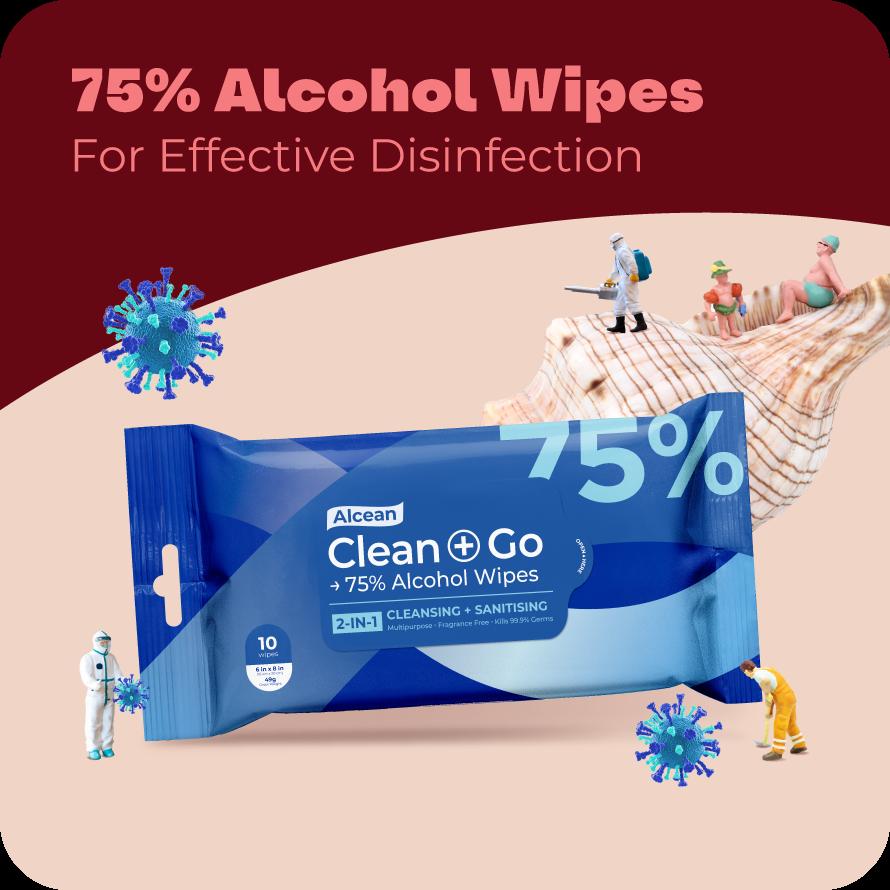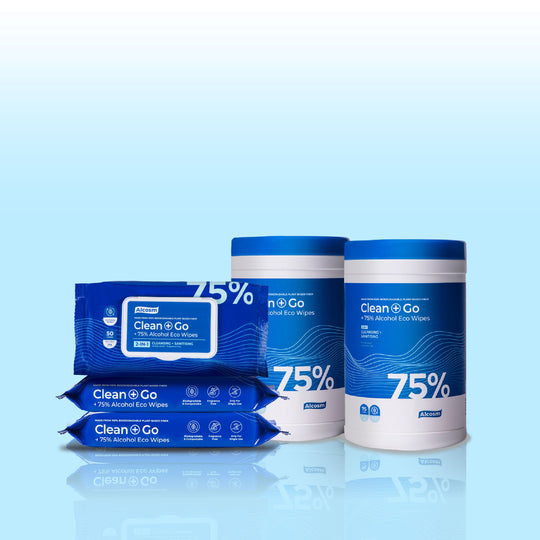
Are You Disinfecting, Or Are You Just Cleaning? Find Out How to Kill Viruses

Why Do People Prefer Alcohol Wipes More Than Hand Sanitiser?
Undoubtedly hand washing is the new must-do task in our day-to-day lives. Although hand hygiene has always been a significant step against infectious diseases, you can't miss up on a day of clean, germ-free hands with a pandemic going on.
Proper hand hygiene is a crucial step in ending the spread of bacteria and viruses. There are many ways to do this, the gold standard being hand washing, but soap and water are not always within reach.
Hand sanitiser and alcohol wipes are two promising alternatives to keep your hands clean intended so that you can quickly and easily clean on the go or even at home. But when you are in front of the display rack, which one should you choose? Let's find out why people prefer alcohol wipes over hand sanitiser.
What is a hand sanitiser?
A hand sanitiser is a disinfectant agent in gel or liquid form that kills bacteria and germs when applied to a soft or hard surface. You can apply it to your hands and leave it to dry, and some are scented with colours and glitter.
What is an alcohol wipe?
Alcohol wipes, also called disinfectant wipes, are alcohol-impregnated fabrics that are "ready-to-use" for disinfection. With strong chemicals, it kills harmful germs, bacteria and viruses in a matter of seconds when in contact with a surface.
Although both aim to disinfect, people tend to prefer alcohol-based wipes over hand sanitisers. Let's find out why.
Why do people prefer alcohol wipes more than hand sanitiser?
A hand sanitiser may seem convenient and safe, but with it come many limitations (even risks), while disinfectant wipes, on the other hand, overcome these limitations in many ways.
1. Safer Around Kids
The fact that a container full of alcohol is within everyone's reach is a risk, even more so for the kids.
Children can instantly ingest hand sanitisers, especially when scented, with glitter and colours, putting them at greater risk of poisoning. The American Academy of Pediatrics says it would be best not to use them on children.
The risk of alcohol poisoning with alcohol wipes is minimal as they are an impregnated fabric and not an easily swallowed liquid. Your children are safer if you wipe their hands with soft wet tissue and then discard it.
2. You can destroy almost all viruses and bacteria (99.9%) with a single wipe.
Hand sanitisers can reduce germs but may not kill them if too little is applied. When using hand sanitiser, large volumes are usually needed to kill most germs as a few drops of liquid sanitiser do not seem to be enough as you thought, but using large amounts may dry out your hands and cause cracked skin.
When it comes to alcohol wipe, each wipe is impregnated with just the right amount of solution you need to kill bacteria and viruses. It effectively disinfects and evaporates quickly within 10-15 seconds thereby wouldn’t be left to soak your hands.
3. Don't leave your hands sticky or even with residue.
When used in gel form, hand sanitiser often leaves a dirty feeling (sticky hands) because of lingering residue that may be an adhesion surface for other germs. The gel form could be the least suitable for disinfecting, plus no one wants to live with that sticky hands feeling.
Disinfecting wipes do not leave any sticky hand feeling after use because they wipe away dirt, grime or residue. With the right formulation of alcohol + pure water and without any additional chemicals, they are suitable and gentle for your skin.
4. Disinfectant wipes not only kill germs but also remove dirt and oil.
Why isn't it utterly effective if hand sanitiser was made to clean hands when soap and water are not around? Because it does not work on oily, soiled or dusty hands. Rubbing the fluid does not help to clean your hands and the whole hygiene point is lost.
With disinfectant wipes, it picks up all the dust and dirt with just a single wipe. Besides, alcohol is proven to be a great oil removal agent and it easily breaks down oil particles. Many people use them before or after eating as it not only disinfects but also removes the greasiness.
5. Perfect for cleaning large surfaces.
Gel hand sanitisers are only meant to be used on hands meanwhile liquid ones are not ideal either as you need an extra towel for wiping (usually an old cloth), which would re-contaminate the already cleaned surface.
On the contrary, a single alcohol wipe is perfect for cleaning not just hands but surfaces such as parcels, countertops, gym equipment, chairs, and other objects!
6. You can safely clean your electronics with disinfectant wipes.
Hand sanitisers are a total no for gadgets. They are not suitable for disinfecting devices such as phones, tablets, or computer keyboards.
Tech specialists recommend regularly cleaning our electronics, but they beg not to spray hand sanitiser on them. Why? For the following reasons:
- They dissolve the internal adhesives.
- Possible internal short circuits.
- Warranty void due to contact with liquid.
They recommend using impregnated disinfectant wipes as they leave the perfect liquid amount and dry within seconds without damage. They are not only gentle on your hands but also designed for your gadgets.
How to properly wipe a surface clean
It is crucial to follow these steps to achieve complete disinfection.
- Fold the wipes into half, providing four clean sides for use when refolded.
- Wipe unidirectionally with overlapping passes, wetting the surface thoroughly to lift and remove contaminants at the end of each. It is crucial to wipe only in one direction (rather than rubbing back and forth).
- Refold the wipe and use it on a new surface. Caution: Reusing the same side for a large surface may promote recontamination and uneven surface wetting.
- Let the surface dry on its own, allowing the chemical to kill bacteria and viruses. It usually takes a few seconds.
Alcosm wipes are the most convenient and effective way of cleaning.
Our disinfectant wipes contain the alcohol required (75%) to kill almost all kinds of bacteria and viruses. They are also multi-purpose and ready to be used in any situation. Safe for both you and your children, and perfect for your hands and surfaces!
Feel The Clean With our 75% Alcohol Wipes!
References
- Alcohol-based wipes shown more effective than rubs in reducing bacteria and spores. (2011, January 2). Retrieved September 23, 2021, from Infection Control Today website: https://www.infectioncontroltoday.com/view/alcohol-based-wipes-shown-more-effective-rubs-reducing-bacteria-and-spores
- D’Antonio, N. N., Rihs, J. D., Stout, J. E., & Yu, V. L. (2010). Revisiting the hand wipe versus gel rub debate: is a higher-ethanol content hand wipe more effective than an ethanol gel rub? American Journal of Infection Control, 38(9), 678–682.
- Gold, N. A., Mirza, T. M., & Avva, U. (2021). Alcohol Sanitizer. In StatPearls. Treasure Island (FL): StatPearls Publishing.
- Golin, A. P., Choi, D., & Ghahary, A. (2020). Hand sanitizers: A review of ingredients, mechanisms of action, modes of delivery, and efficacy against coronaviruses. American Journal of Infection Control, 48(9), 1062–1067.
- Hand sanitizers: Keep children safe from poisoning risk. (n.d.). Retrieved September 23, 2021, from Healthychildren.org website: https://www.healthychildren.org/English/health-issues/conditions/COVID-19/Pages/Keep-Hand-Sanitizer-Out-of-Childrens-Reach.aspx
- Show me the science – when & how to use hand sanitizer in community settings. (2020, September 10). Retrieved September 23, 2021, from Cdc.gov website: https://www.cdc.gov/handwashing/show-me-the-science-hand-sanitizer.html



